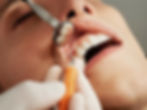- Paul Andrews

- Oct 11, 2023
- 2 min read

Having a fear of visiting the dentist isn't uncommon, however it's something that should be addressed as if you go too long without having a check up, this could be putting your oral health at risk. There are a number of things you can do however to help you get over your fear, here, Dr Rhona Eskander, Dental Expert at dentalphobia.co.uk shares her 10 tips for getting over your fear of visiting the dentist.
What Is Dental Phobia?
Dental phobia, also known as dentophobia or odontophobia, is an intense and irrational fear of receiving dental care or undergoing dental procedures. It goes beyond normal apprehension and can lead to extreme anxiety, panic attacks, and avoidance behaviour when faced with the prospect of visiting a dentist. This fear often stems from past negative experiences, a fear of pain, a sense of loss of control, or even general anxiety disorders.
What Are The Dangers Of Having Dental Phobia?
Dental phobia can have serious consequences for oral health and overall well-being. Individuals with dental phobia often avoid regular dental check-ups and necessary treatments, which can lead to the progression of dental issues such as cavities, gum disease, and infections. Untreated dental problems can cause chronic pain, discomfort, and even tooth loss, negatively affecting an individual's ability to eat, speak, and maintain proper oral hygiene.
Here are my 10 tips for getting over your fear:
Acknowledge Your Fear: The first step to overcoming dental phobia is recognising and acknowledging your fear. Understand that your feelings are valid and that many people share similar concerns about dental visits.
Choose a Supportive Dentist: Research and select a dentist who specialises in treating patients with dental anxiety. Discuss your fears with them beforehand so they can tailor their approach to make you more comfortable.
Gradual Exposure: Start by visiting the dental clinic without receiving any treatment. Gradually expose yourself to the environment, sounds, and sights to desensitise your fear over time.
Communication: Openly communicate with your dentist about your anxiety. Establish a signal to indicate when you need a break during the procedure, allowing you to feel more in control.
Relaxation Techniques: Practice deep breathing, meditation, or visualisation exercises before and during your appointment to help reduce anxiety and promote relaxation.
Distraction: Bring headphones and listen to calming music or an audiobook during the appointment to divert your attention from the procedure and relax your mind.
Desensitisation: Gradually work your way up to more complex procedures. Start with simple cleanings and gradually progress to more involved treatments as your confidence increases.
Cognitive Behavioural Therapy (CBT): Consider seeking therapy that specialises in treating phobias, like CBT. This approach can help you reframe negative thought patterns and develop coping strategies.
Sedation Options: Discuss sedation options with your dentist, such as nitrous oxide (laughing gas) or oral sedatives, which can help you remain calm during the procedure.
Regular Visits: Maintain a routine of regular dental visits to prevent minor issues from escalating into major problems. The more frequently you visit, the more familiar and comfortable the dental environment will become.






